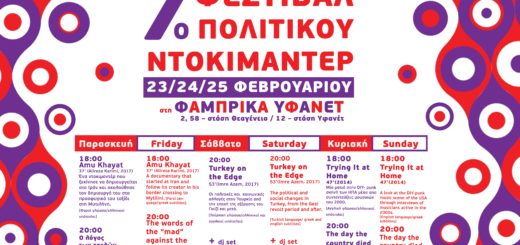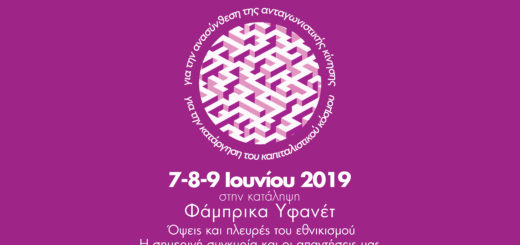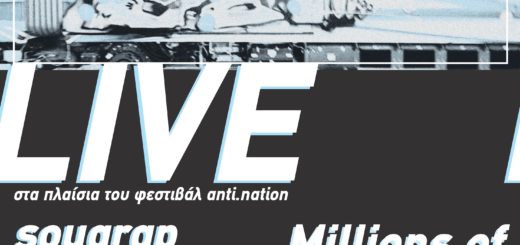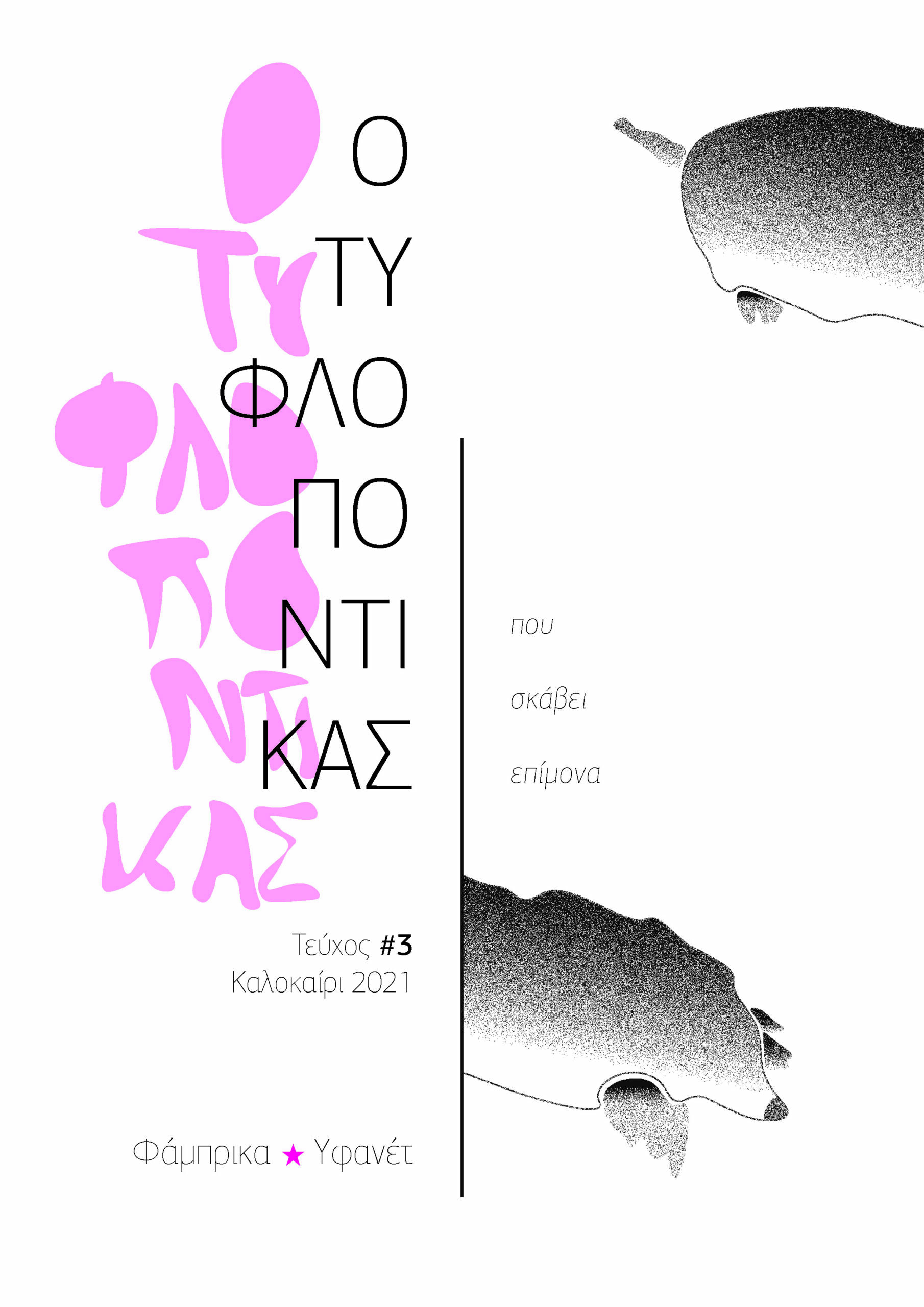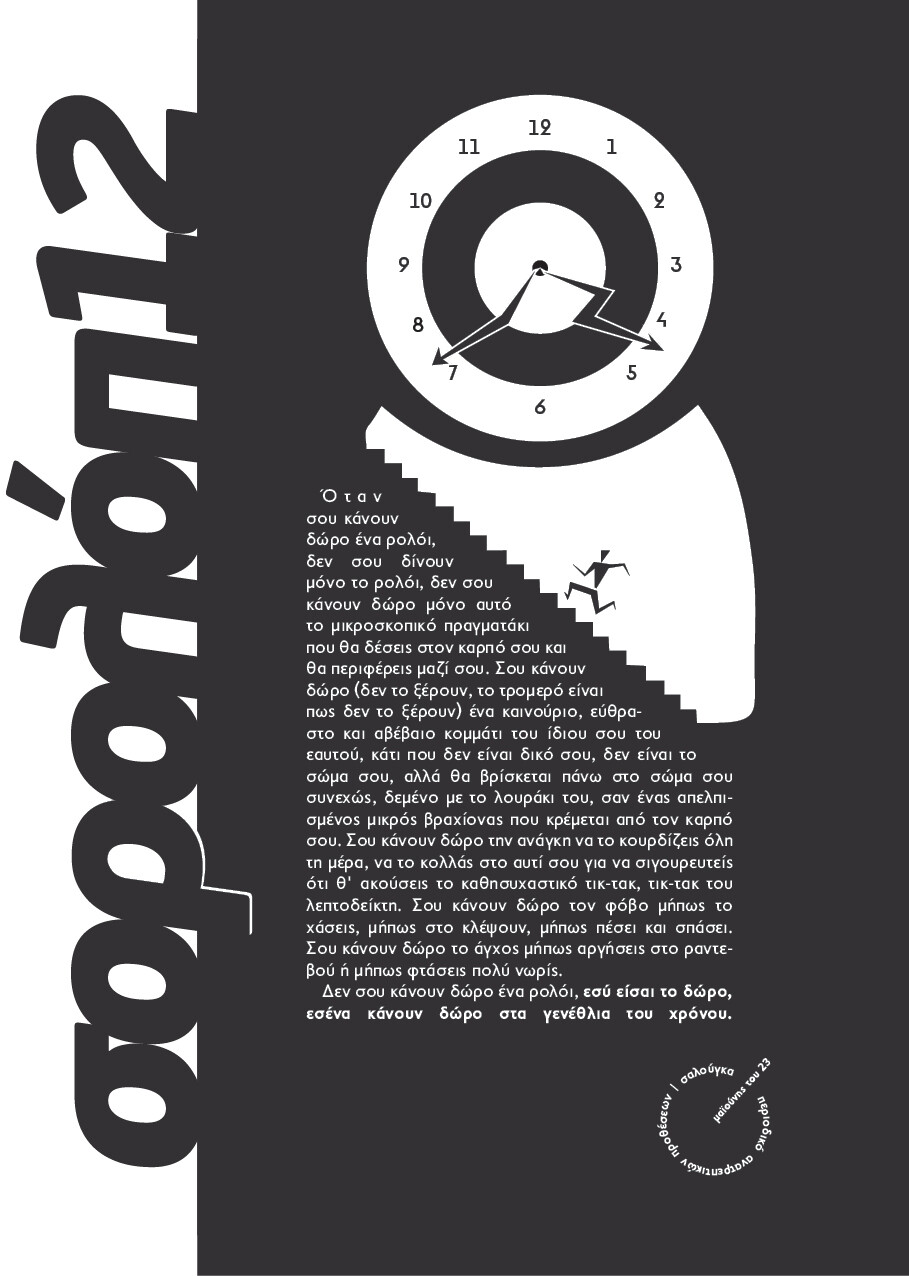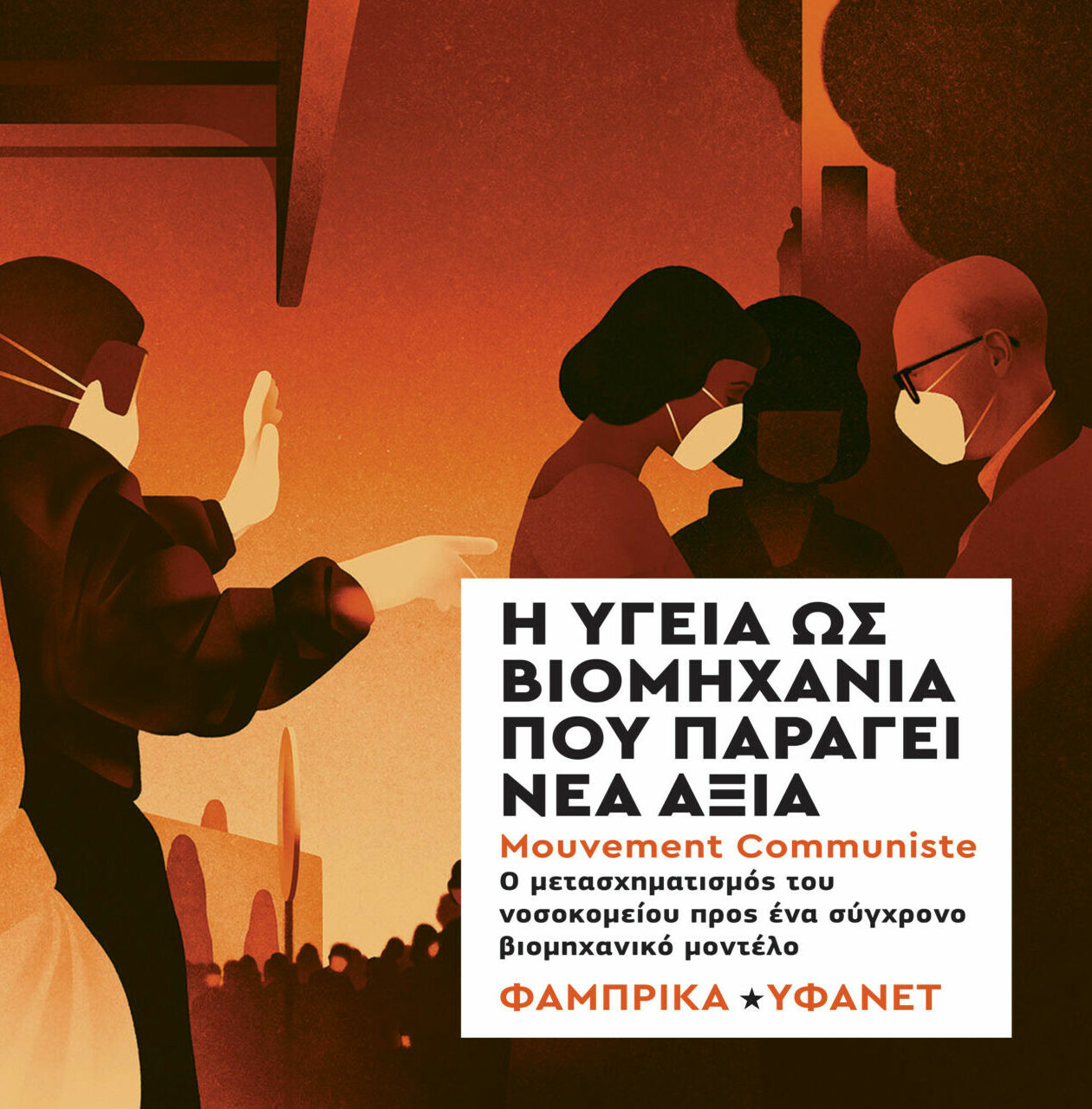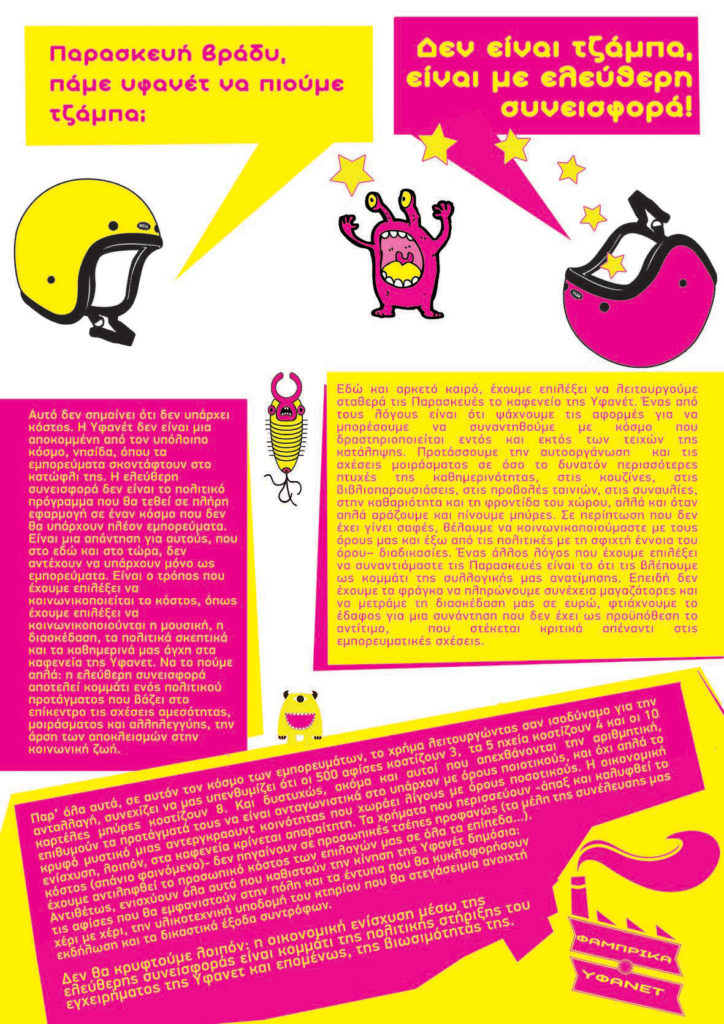A call for participation in anti.nation festival – conference
anti.nation festival – conference
for the resurgence of moves of social antagonism
for the abolition of the capitalist world
Call for participation
The following text is an invitation for participation in an anti-nation festival – conference in the city of Thessaloniki, at Fabrika Yfanet squat, on 7-9 of June.
The reason behind this call is everything that we faced and we are still facing in Thessaloniki -but in the rest of the country too- since last year, from the moment the naming issue of Macedonia was brought up again. The nationalist explosion that followed did not come out of the blue; it is deep rooted in historic time and surfaces at times with intense or milder outbreaks. The reinforcement of national identity as part of State policy, the rallies of 1992 for the Macedonian dispute1, the exploitation of migrant workers in fields and factories, the forced prostitution of migrant women, the national pogrom against Albanian migrants in September of 20042, the God-Country-Family doctrine, the deaths of migrants in the borders and the detention centers for those who survive, the rising of fascist and far-right groupings –and the list never ends– are some of the forms and the contents that nationalism has taken depending on the occasion.
Currently, the naming issue of the adjacent country is reflected on public discourse as a conflict between two competitive patriotic/nationalist faces concerning the national interest. From the one side we have progressive patriotism, expressed by SYRIZA, State institutions and alternative mayors. The resolving of the naming dispute is perceived as a step towards national development, capital investments and consolidation of the nation’s interest in the Balkans. These are recognized as the factors which contribute to better international coordination and resolution of the disputes. From the other side, the revival of the question of the name of the adjacent country detonated the emergence of the classic, traditional nationalism, with the support of the populist right. This time it appears and presents itself as an anti-establishment force, in contrast with its previous outbreaks. It accelerated the continuous procedure of constitution of the national unity, which is performed through social processes like family, school and church. Through these events, a mob of fascists, far-righters and hooligans managed to upgrade the organization of their actions and to claim a part of the public space with the blessings and the social legitimization of priests and institutions, patriotic and military unions as well as political parties, right-wing and left-wing. Highlights of all these were the nationalist rally in Thessaloniki in 21/1/2018 which lead to attacks at Scholeio squat and at the anti-national counter-gathering and the arson of Libertatia squat; the attack on the self-organized sports team Proodeutiki Ekrixi Toumbas during a football match; the nationalist student school occupations; and the clashes with the police at Prespes, at the international expo in Thessaloniki and at Syntagma square in Athens.
Meanwhile, as a movement, we are puzzled and we are unable to understand, analyze and counter-attack the imaginary community of the nation and its fascist/nationalist vanguard. Imaginary but with real and material results, which also affect the bodies and lives of those who do not fit in the nation’s narratives. The anti-imperialist analyses; the occupation and dependence scenarios and the inter-class notion of the people; the anti-fascist ideology as the only approach, are all attempts that do not seem able to respond to today’s demanding reality. We do not want to underestimate the various steps and attempts which the movement has made. We just want to share our concerns, discuss the dead-ends and the effectiveness of our actions regarding all of the previous period of the rising nationalist ideology.
W e may be taking the initiative to call for this festival but we seek its outcome to overcome us, with the participation of parts of the social antagonism movement which find important such a meeting and theoretical insight. With this in mind, we are searching for ways to conduct a dialogue, within the movement, on the issues of nation/nationalism and how they relate and interact with gender, class and with our own struggles. How these different social forms of the capitalist totality interact and relate to each other. We hope the conference –we are borrowing the term conference from the meetings of the Italian and German movement in times of polarization- becomes a meeting of the antagonistic movement and contributes to the rise of a public sphere of the movement. A sphere able to make use of the proletarian experiences and needs, the antagonistic contents and critical tendencies of the struggles; to realize the changes and shifts in the social field with aim to provide feedback in the social movement for the resolution of the social –and not the national, as they are trying to convince us– issue.
We do not aspire to organize another separated theoretical activity or just another academic debate. Certainly though, we believe that we have first to understand this world, in order to struggle against it. We consider theory and analysis important, inseparably connected to our overall participation in the social antagonism movement. In other words, we do not fetishize theory; we are searching ways to sharpen our critical thought, to make our praxis more dangerous, to illuminate what happens before defeat and despair prevail, before our needs get buried under the national interest.
We think that the anti-national/antifascist “likes” and the now digitized political debates on social media are insufficient to reinforce a dialogue within the movement. We are interested in a militant debate, here and now, in real time, in the spaces where struggles meet and circulate, in the spaces where subversive ideas are diffused, in the squats and out of them, in every space where our collective resistances take place. To complement this, we do not aim to present a revolutionary program for the salvation of the people and to dictate which strategy will make us “overcome the crisis of the movement”. And this because we believe that we cannot advance through walking on beaten paths, but through our daily movements and through the understanding of the contradictions of the capitalist world. These contradictions help us produce alive, antagonistic critiques and break our own paths.
If this festival wants to achieve something, this is to scream –like in the painting of E. Munch– against the dead silence that is imposed. A scream for all the above, which disgust us and suffocate us in various ways on our daily lives. The festival is a form of rejection. A rejection of the imaginary community of nation and national identity, of nationalist ideology and every ideology. A questioning of the capital relation and its dominance over our lives. When we speak of rejection, we do not mean that we just have to turn our heads away, nor that the mere fact of announcing our rejection is sufficient for us to rest, to say that we did what could have been done. On the contrary, we mean to not remain idle. To attack in whole the community of the nation, as well as the violence and the meanings that it produces. We want to search and clarify the possibility of collectivizing and amplifying this rejection in the city of Thessaloniki, and further away. We are not merely referring to the better organization of the movement and the creation of coalitions but to the strengthening of critique, of fantasy, of the content, of the communication and circulation of all the practices against capital –the relation that oppresses our lives- and its nations. This being said, we do not care about a festival that will bear our signature, but we want a festival from and for the antagonistic movement. We think it is crucial to realize and support the festival in the city of Thessaloniki because it is a center of national events and of the continuation of the “revolution from the right” and also because this city remembers its multinational past only when it uses it to produce value3. We are here to remind once again that “In this city, in this country, in this region, there are still some people who are bastards with memory”. And they will continue to be here and they will take battle positions, until the scream of despair becomes a melody of collective rage.
Structure
The following structure is a suggestion; it is open to changes, enrichments and disagreements. We suggest three basic sections with subsections, which are still in the organizing phase. We mention them here so they can be collectively edited. Please inform us about which subsection(s) you would like to present by the 31st of March, so we can make the program and eventually announce it publicly. If there is no subsection which suits you, inform us so we can see how we can include it in the program.
We are going to inform you later about the organizational matters of the conference.
You can contact us at contact@yfanet.net
The question of nation in social and class struggles
-
Strikes organized from above, Social Alliance and national day of action4 and the self-organized response of the movement
-
Ways of organizing around the migrant experience, forms and organization of common struggles between locals and migrants
-
From the square occupations by Aganaktismenoi (Indignados) to the right-wing revolution: the limit of nation in social and class struggles
Faces of nationalism
-
War, interstate competitions, the role of NATO and army objection
-
Internationalism from above: populism of the social movements and anti-imperialism as affirmation of the nation
-
Interweaving of nation and gender: family as their meeting point
The situation today and our responses
-
Identity movements, the demand for peoples self-determination and minority groups
-
The Macedonian issue after the Prespes accord: the continuation of nationalist ideology and the shifts in the social field
-
Antifascism as a response to the current events and its limits
1 In 1992, mass nationalist protests took place in Thessaloniki and Athens with the motto “Macedonia is Greek”
2 On September 4, 2004, after the Greek national football team lost to the Albanian one, thousands of Greeks took the streets beating and murdering migrants. Three hundred migrants were hospitalized and Gramoz Palushi, a migrant worker from Albania, was murdered.
3 The alternative mayor of Thessaloniki capitalizes the city’s multicultural past through the construction of monuments about the Jewish population and restoration of monuments from the Ottoman period, with the goal of attracting more tourists.
4 The Social Alliance was a coalition of the biggest syndicates (GSEE and ADEDY) with other professional unions and think tanks. They called for the National Day of Action on 30/5/2018, which included a general strike and other actions, with mostly liberal demands.Z
You can download the pdf : here

